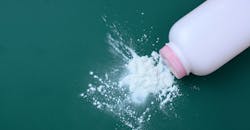Johnson & Johnson Chief Executive Officer Alex Gorsky told a New Jersey jury weighing punishment for the company over cancer claims that he relied on internal experts when he went on national TV to insist the company’s baby powder was safe and didn’t contain asbestos.
With J&J facing almost 17,000 lawsuits from users of talc-based powders, Gorsky testified Monday for the first time in court for the punishment phase of a trial in the company’s hometown of New Brunswick. In October, a separate jury awarded $37.2 million in damages to four people.
Gorsky told jurors his public statements defending the product weren’t based on his personal knowledge of the science but rather “experts with deep knowledge” about testing, including company analysis that showed no traces of asbestos, a known carcinogen.
Still, the CEO acknowledged he can no longer say that, because the U.S. Food and Drug Administration found traces of asbestos in one lot of Baby Powder three months ago. The government ordered the world’s largest maker of health-care products to recall 33,000 bottles. J&J said its own tests later disputed the agency’s findings, but regulators stood by their conclusion.
Chris Panatier, a lawyer for the former talc users in the New Jersey case, noted Gorsky’s earlier assertion, that “regulators have tested our talc and found it to be asbestos free,” was still on the company’s website in a 2019 message from the CEO to employees.
FDA officials scheduled a public hearing for Feb. 4 to discuss different methods for testing talc in consumer products. An agency advisory panel has endorsed tougher testing standards opposed by talc makers.
Trace Amounts
Plaintiffs’ lawyers contend internal J&J documents show officials knew since the late 1960s baby powder mined in places such as Vermont and Italy contained trace amounts of asbestos, but failed to alert consumers or regulators. Asbestos is often found intertwined with talc when mined.Gorsky was ordered to testify about statements he made in print and on TV -- including on Jim Cramer’s “Mad Money” program on CNBC -- that tests on baby powder over the years showed the product “never contained asbestos.”
The New Jersey case is just one of thousands that may eventually cost the company as much as $10 billion, according to Bloomberg Intelligence. Though the product accounts for only a small fraction of J&J’s annual revenue, it’s been a core brand for the company for more than a century.
While the company could be forced to pay punitive damages in the New Brunswick trial, it has been on a roll in court recently in talc cases. It won eight trials last year, while losing five. It has appealed all its losses.The case is Barden vs. Brenntag North America, L-1809-17, New Jersey Superior Court, County of Middlesex (New Brunswick).
By Jef Feeley
About the Author
Bloomberg
Licensed content from Bloomberg, copyright 2016.
